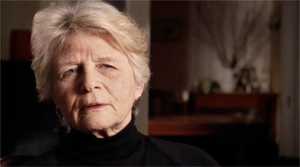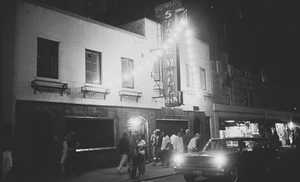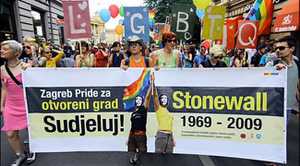Interview: Ed Koch
Ed Koch was the Mayor of New York City from 1978-1989. Born in the Bronx, he served as a New York congressman from 1969-1978, and he has authored several books. In 2011, AMERICAN EXPERIENCE interviewed Koch about gay civil rights in New York in the 1960s.

What was Greenwich Village like in the 1960s around the time of the Stonewall uprising?
I moved into the Village in 1956 and was the Democratic District Leader from 1963 to 1966, which is when I became the neighborhood's City Councilman. At the time, the Village was comprised of three main groups: the Italian community, which lived primarily south of Washington Square down to Houston Street and below; the Jewish middle class, which lived primarily on Fifth Avenue and on Sixth Avenue, as well; and the third group were the bohemians. That was the term we used then for people who had a Village state of mind, and that included a large group of gay people. That kind of attitude and lifestyle is now more reflected in the Chelsea neighborhood [north of the Village] than in the Village today.
Wasn't the West Village something of a gay Mecca?
For the city of New York, the Village in those years was perceived to be the place to go if you were looking for gay clubs. Christopher Street was the center of the gay neighborhood, which over time expanded to include most of the West Village. Christopher Street runs from Greenwich Avenue all the way west to the Hudson River. There were lots of people who weren't gay who lived on Christopher Street, but that was the heart of the neighborhood. There were bars, there were restaurants, and while they were overwhelmingly gay, none were exclusively gay as far as I know. The lesbian bars were more in the south Village on MacDougal Street and Bleecker Street.
What sorts of complaints did you hear from Village residents during those years? First, what sorts of complaints did you hear about gay people?
As part of the political campaigning I did in the Village, I created a community group called the MacDougal Area Neighborhood Association, and it had all the community people on it, and they would come and tell me what was bothering them. The complaints came particularly from the south Village community, where residents believed that there was sexual activity of a private nature taking place on public streets. That's an area where there were a lot of families and they were incensed by it. They weren't incensed at people being gay or lesbian, but they were incensed at the conduct of some gay people. You have to understand that the gay community had been repressed and harassed and persecuted, so some acted out, which gave other gay people a bad name.
What were the complaints you heard from gay people?
There were complaints, as there should have been, from gays about police entrapment in subway bathrooms. I complained to Mayor Lindsay and to his police commissioner, and eventually Mayor Lindsay stopped it. Years later, in 1974, Mayor Lindsay issued an executive order banning discrimination based on sexual orientation in city employment and housing, as well. Mayor Beame did not reissue that executive order -- an executive order lasts only as long as a mayor is in office, but I issued that same executive order in the first 30 days of my administration in 1978.
When public officials and people running for elected office spoke in the 1960s of "cleaning up" the Village, what did they mean? Police raids of gay bars? Arrests?
What it meant was, not to stop in any way homosexual activity, such as pickups or what any couple might do in seeking sexual activity. Cleaning up meant "stop f***ing on the streets," and that's not unreasonable.
You publicly supported the cleanup effort? Why?
The cleanup was directed at homosexual and heterosexual public sexual activity, and I don't know how anyone can object to that. There's nothing illegal about seeking sex, but there's something illegal about paying for sex, and there's something illegal about exposing genitalia or engaging in sex on the streets and on stoops. In the area south of Washington Square, people found condoms on their front stoops and in the street.
Over the years, but not in the immediate aftermath of the Stonewall riots, you've spoken enthusiastically about the Stonewall uprising and gay people fighting for their rights. What sort of reaction would there have been if you had said those things in June 1969?
In the Village the reaction would have been very positive. I don't know what the reaction would have been elsewhere. I suspect half the population would have been positive and the other half not.
Why didn't any local gay politicians speak out at the time in support of gay people and gay rights?
I don't know of any politician at that time who was openly gay. That didn't exist.
Why not?
It would have been perceived as a very heavy load and difficult to win. Even though there was a substantial gay population it was certainly not close to a majority. Today, in huge areas of the country, an openly gay person running for office would still find a significant number of voters who would be put off by it. In some parts of NYC even, but overall I don't think it would mean that you were walking into the room with a stone on your back, which would have been the case in 1969.
Do you think gay people are better off today than in 1969? How so?
There's no question about it. There are many cities, not just New York or San Francisco, but many cities throughout the country, where being out and participating in political or other public activities is no longer a problem or is only a limited problem. You have a number of gays publicly identifying themselves running for office throughout the country.
But it would be foolish to say that there is no problem. There is still a huge problem. Most people don't understand that there are only 20 states in the union where gays are protected from discrimination. In 1986 we passed an anti-discrimination law here in New York City before the state did and that was under me. I got the City Council to do in the private sector what the Mayor was able to do in the governmental sector and I'm very proud of that. As important as the right to same-sex marriage is -- and I'm supportive of it -- it's more important that you prohibit discrimination in housing, education, and employment in every state in the union.
Do you remember your first Gay Pride march as mayor?
Of course! That was in 1984. I was the first New York City mayor to march, and 20 commissioners volunteered to march with me. They wanted to show solidarity. I was well received. People watching the parade applauded. That felt terrific.
I think I have a very good reputation amongst the gay population and among the whole country because I stood up on the issue of gay rights. It is not easy to stand up on that issue when you are single and male in New York City. I did it anyway.







